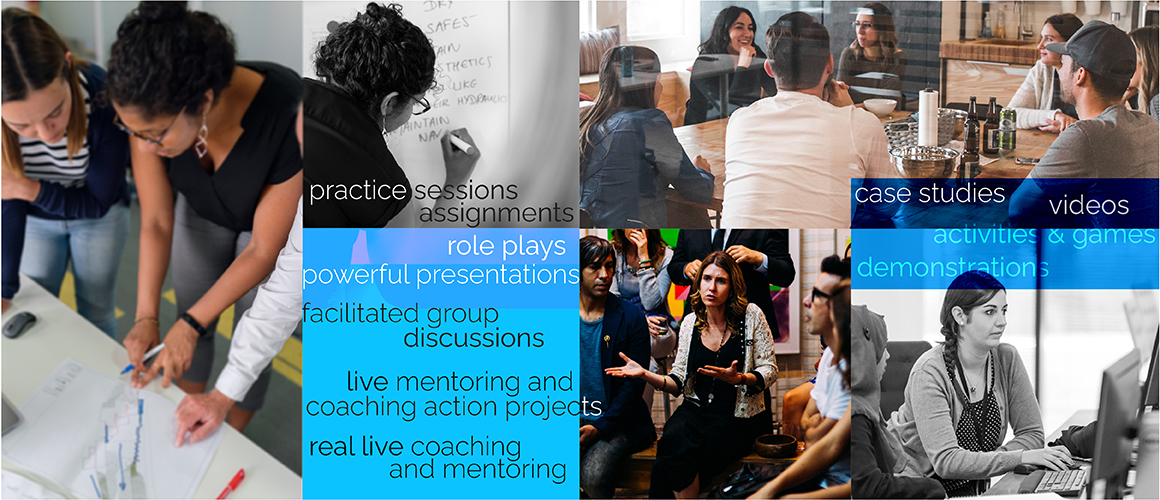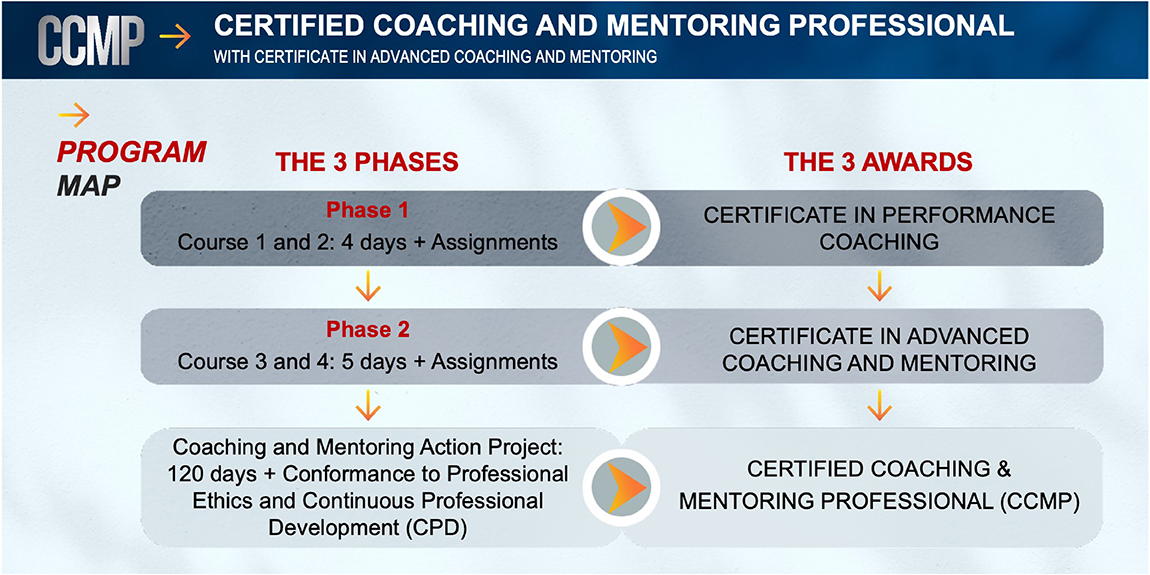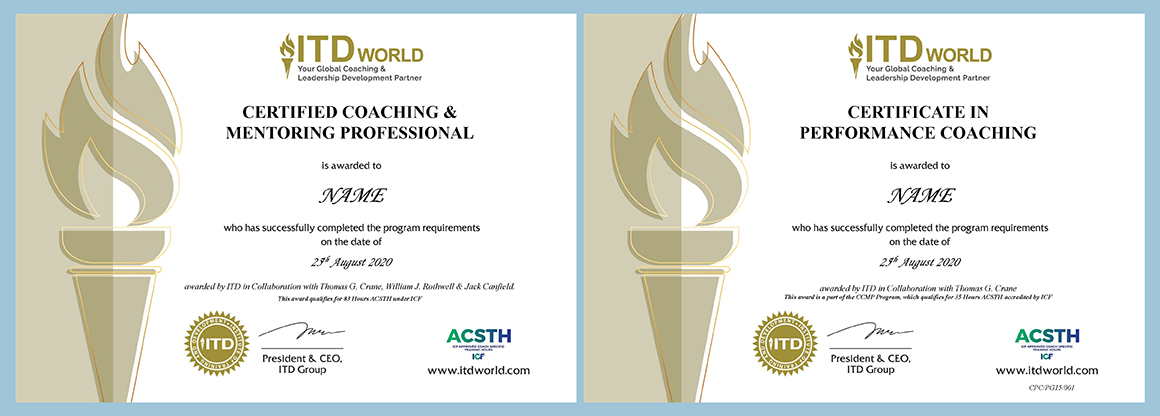Upon finishing our international coaching certification program, you are well-equipped to powerfully help people to achieve accelerated success – by sharing your knowledge, experience, expertise and connections as a coaching/mentor. You will also teach, advise, guide and support the person you mentor to outstanding results.
Below are some benefits of attending our Certified Coaching & Mentoring Professional class:

The Certified Coaching & Mentoring Professional program (CCMP) is suitable for individuals who need to lead and develop others in both private and public sectors – including CEOs, Directors, Senior Executives and Managers plus those seeking to develop their competencies to be a coaching and mentoring professional.
For beginners who have just stepped into the field of coaching, you may consider getting started with our Certificate in Performance Coaching (CPC) – which, essentially, covers the first 2 modules of CCMP.
Alternatively, for those who already have coaching certifications, you can perform the next step – by attending our Certified Chief Master Coach (CCMC) class.
Practice sessions, role plays, videos, case studies, facilitated group discussions, coaching and mentoring activities and games, demonstrations, powerful presentations by facilitators and participants, assignments, real live mentoring and coaching in action, live mentoring and coaching action projects.

Our coaching and mentoring training program (CCMP) comprises four modules. Each contains its own collection of teachable points, unique insights, skillsets, techniques, exciting activities, live demonstrations and projects to successfully equip you with the what, why and how-to for coaching and mentoring others for sustainable outcomes.

Familiarize yourself with what coaching entails in this module. Adopt the required coaching mindset and equip yourself with the five essential skills you need to coach others effectively.
Take a deep dive into the heart of coaching by learning and applying the seven types of coaching conversations to become an effective coach at work.
Get yourself acquainted with the makings of a great mentor by adopting and applying the six essential mentoring techniques in any mentoring sessions.
Equipped yourself with powerful advanced coaching and mentoring techniques that you can apply in coaching conversations or mentoring situations. Internalizing and assimilating The Coaching Principles (TCP) enables you to help others achieve their breakthrough goals in work and life.
Coaching for Breakthrough Success: Packed with stirring personal stories, life changing case studies, crucial coaching conversations, exemplary coaching questions, inspirational coaching quotes and ready-to-use tools that equip you to achieve professional mastery in coaching. This practical manual guides you through the top 30 principles every coach needs to succeed. You’ll learn the six paradigms of Situational Coaching, the ultimate power of Achievers Coaching Techniques, and the tried-and-true secret to making impossible dreams possible.
Our coaching and mentoring training program’s facilitating team comprises a talented blend of experience and expertise. Cumulatively, all members of the team have coached, mentored and trained thousands of people around the world for more than 30 years.
Each of them has learned from the best in the fields of leadership, coaching and mentoring as well as being certified by various industry leading organizations.

ITD has been certifying UN trainers since 2007, we benefited from this splendid delivery. Since then I and my chief of section recommended ITD to all training Chiefs and Officers in all UN missions. Even UNHQ staff members have benefited from ITD’s expertise. Since ITD entered the UN system, its trainers showed great improvement.
•••Maria Cecelia Icaro, United Nations Integrated Mission Training Center
Many people who used the two terms coaching and mentoring interchangeably – but doing so is not accurate. Coaching is the process of drawing out solutions from the people being coached so their potential is unleashed. In a coaching conversation, the coach does not provide the solution or even, suggestions, unless expressed permission is obtained. Instead, a coach uses various coaching techniques to empower the person being coach to come up with their own answers.
This is different from mentoring. In a
mentoring session, the mentor actively provides advice, suggestions and recommendations on
the
course of action a mentee should pursue in a given scenario. The mentor takes a very active position
in ensuring the person being
mentored benefits from the mentor’s wealth of experience and
expertise.
Executive
coaching makes successful leaders even more successful. The executive coach engages the
executive to drive positive
transformation for outstanding outcomes. The transformation is
enabled through a combination of leveraging on strengths and closing
the gaps. Leaders who
successfully do both overcome their internal and external roadblocks in their pursuit for better
results.
Yes, ITD World’s Certified Coaching
& Mentoring Professional (CCMP) program is recognized and accredited by the International
Coach
Federation (ICF). The organization is the world’s largest organization of professionally
trained coaches.
ICF accredits rigorously reviewed
coaching programs which delivers coach-specific training that is aligned with the ICF Core
Competencies and Code of Ethics. You must complete the course and successfully pass all the projects
assigned to be credited with the
83 Approved Coach Specific Training Hours (ACSTH) from ICF.
The CCMP program is also recognized by the Malaysian government’s Human Resources Development Fund (HRDF) under its funding schemes for employers to upskill leaders and talent in their organizations.
Contact Us for More Information

You can join our blended learning classes where our centers are located. Check the calendar for a suitable time and convenient place for you.
Attending a live coaching and mentoring training class means you get to meet the trainer face-to-face as well as network and connect with your fellow participants who are on the same path as you. This blended learning option also gives you access to our e-Learning platform so you can further reinforce your learning.
Alternatively, the entire CCMP program is available online at our e-Learning platform so you can learn at your own time and pace with an Internet connection. If you are planning to take the online journey, be sure to check out the e-Workshop dates so you don’t miss out on all the exciting sessions with our experienced and expert trainers who will deliver live trainings over the Internet right to your device. Don’t worry, you can also network and connect with participants around the world by taking the course online as you will be meeting them digitally.

If you just want to get your feet wet in the world of coaching and mentoring, each of the four modules are separately available online for you to pick up the knowledge, skills and techniques on your own.
Click here to start your learning anytime and anywhere with an Internet connection! You can also drop us a line and we will get back to you soonest.
The Certified Coaching & Mentoring Professional program is one of the only truly international courses in Asia that is recognized by International Coach Federation (ICF), the world’s leading professional non-profit body for coaching and approved for 83 Specific Coach Training Hours. Mentoring, coaching and growing people is one of the most fulfilling and rewarding work of a lifetime.
Pennslyvannia State University Professor William J. Rothwell
We believe our Certified Coaching & Mentoring Professional (CCMP) is one of the most outstanding coaching and mentoring training programs available in the market. It contains the best combination of design and intellect from the world’s top coaches, mentors and peak performance gurus – and is recognized and approved by the International Coach Federation (ICF).
When you join, you will receive access to ITD World’s e-Learning platform so you can develop yourself anytime and anywhere via the Internet. You will also get an all-in-one comprehensive results-based learning solution and obtain cutting-edge tools, learning materials and best-selling books to support effective research, learning and application to take you to the next level of success.
REGISTER TODAY or access the program now to take the first step on this rewarding and fulfilling lifetime journey.
Let's keep in touch! Subscribe to receive the latest updates on our solutions.
SUBSCRIBE